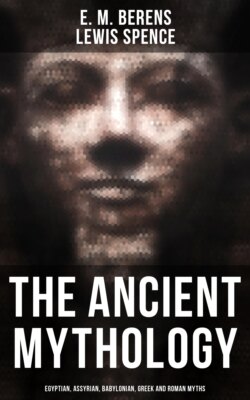Читать книгу The Ancient Mythology: Egyptian, Assyrian, Babylonian, Greek and Roman Myths - Lewis Spence - Страница 96
На сайте Литреса книга снята с продажи.
Hadad
ОглавлениеHADAD OR RIMMON
Ramman or Rimmon, identified with Hadad or Adad, is a deity of later type and introduction. Indeed Ramman may be merely a variant or subsidiary name, meaning as it does 'the thunderer,' quite a common title for several types of deities. The worship of Hadad was widespread in Syria and Palestine, and he was a god of storms or rains, whose symbol was the thunderbolt or the lightning which he holds in his grasp like a fiery sword. But he bears solar emblems upon his apparel, and seems to wear a solar crown. He does not, however, appear to have had any centre of worship in Babylonia, and was probably a god of the Amorites, and becoming popular with the Babylonians, was later admitted into their pantheon. At Asshur in Assyria he was worshipped along with Anu, with whom he had a temple in common. This building, which was excavated in 1908, contains two shrines having but the one entrance, and the date of its foundation is referred so far back as B.C. 2400. There can be little doubt that the partnership of Hadad with Anu was a late one. Perhaps it was on Assyrian and not Babylonian soil that Hadad first entered from the alien world.
In many of his characteristics Hadad closely resembled En-lil. Like him he was designated 'the great mountain,' and seems to have been conceived of as almost a counterpart of the older god. It is peculiar that while in Assyria and Babylonia Hadad has many of the characteristics of a sun-god, in his old home in Syria he possessed those of a thunder-god who dwelt among the mountains of northern Palestine and Syria and spoke in thunder and wielded the lightning. But even in Assyria the stormy characteristics of Hadad are not altogether obscured. Hadad's cult in Babylonia is probably not much older than the days of Khammurabi, in whose time the first inscriptional mention of him is made. His worship obtained a stronger hold in the times of the Kassite dynasty, for we find many of its monarchs incorporating his name with their own and altogether affording him a prominent place.
